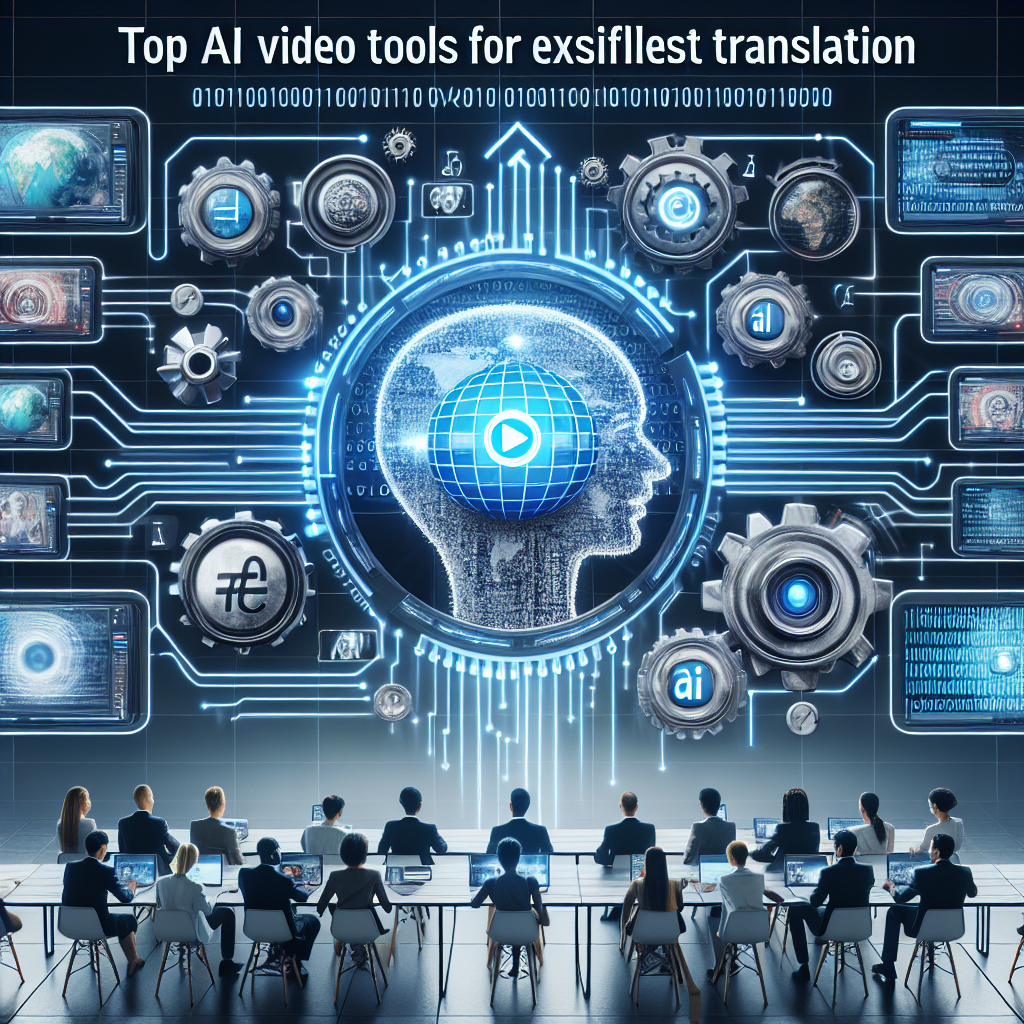In our increasingly globalized world, content creation is no longer confined to a single language. Video content, particularly, requires effective translation tools to reach a broader audience. As businesses and creators strive to expand their reach, the emergence of AI-driven video translation tools proves indispensable. Let’s explore some of the top AI video tools that are revolutionizing automated translation.
The Rise of AI in Video Translation
Video content accounts for over 80% of online traffic, making it crucial for businesses to deliver their messages across different languages. Traditional translation methods can be time-consuming and costly. With the advent of AI, however, automated translation is becoming increasingly efficient. These tools help creators focus on their core message while ensuring that their content is accessible to diverse audiences.
What to Look for in AI Video Translation Tools
When selecting an AI video translation tool, consider the following key features:
- Accuracy of Translation: The tool should ensure that translations maintain the original meaning and context.
- User-friendliness: A simple interface can save time and streamline the translation process.
- Integration Capabilities: The ability to integrate with existing video platforms can enhance workflow.
- Customization Options: Personalizing translations to match branding or tone can improve user engagement.
- Scalability: The tool should efficiently handle various project sizes.
1. DeepL Translator
A Game Changer in Automated Translation
DeepL, primarily known for its text translation service, is making waves in the video translation sphere. By using deep learning algorithms, it translates videos with remarkable accuracy. With fewer errors compared to traditional methods, DeepL allows creators to maintain the essence of their original content.
User-Friendly Interface
The tool’s easy-to-navigate dashboard is perfect for both seasoned professionals and beginners. Users simply upload their video, and DeepL begins the translation immediately, minimizing downtime.
2. Kapwing
Collaboration Meets Translation
Kapwing is an all-in-one video editing platform that includes AI-driven translation features. Its collaborative nature lets teams translate and edit videos simultaneously, ensuring efficiency.
Subtitle Generation
The automatic subtitle generation feature is particularly helpful, allowing users to quickly add translated text to their videos. The platform also supports multiple formats, meeting diverse user needs.
3. VEED.IO
Simplicity and Effectiveness Combined
VEED.IO is designed with simplicity in mind. Its automated translation service allows users to convert video audio into various languages with just a few clicks.
Customization Options
Creators can adjust the text color, size, and position, ensuring that the translated subtitles are visually appealing and meet branding guidelines.
4. Google Translate for Video
The Giant of Language Translation
Though Google Translate is primarily known for text translation, it also offers features for video. Users can extract audio text using other Google services and utilize the powerful translation capabilities of Google AI.
Integration with YouTube
With YouTube being a top video platform, Google’s AI tools seamlessly integrate, allowing content creators to reach a global audience effortlessly.
5. Flixier
Speedy Translation Services
With its cloud-based architecture, Flixier provides fantastically quick translation services. The platform ensures that even large video files are processed without a hitch.
Team Collaboration at Its Best
Flixier features real-time collaboration tools, so teams can implement translations and edits together, promoting a smooth workflow.
6. Subtitle Edit Pro
Focus on Subtitles
This tool goes beyond mere translation and provides extensive subtitle editing options. Users can create, edit, and translate subtitles, making it one of the best options for professional editors.
Batch Processing
Subtitle Edit Pro allows batch processing, making it easier to handle multiple video files, saving users both time and effort.
7. Transcribe
The Manual Meets the Automatic
While traditionally aimed at transcribing audio, Transcribe now includes AI translation features. This dual capability makes it a favorite among content creators who require both functionalities.
Quality Control
Transcribe allows users to manually adjust translations, ensuring that the final product truly resonates with their target audience.
8. LingoPie
Educational Purposes
LingoPie offers a unique serving of AI translation specifically tailored for language learning. Users can watch videos while reading subtitles in both original and translated formats, promoting language proficiency.
Interactive Features
The tool’s interactive components allow for a more engaging experience, increasing user retention and understanding.
9. Vidnoz
A Rising Star
Vidnoz is gaining traction for its powerful AI translation capabilities. Users can upload footage, and the tool automatically recognizes spoken language, enabling swift translation.
Real-Time Translation
The real-time translation feature makes it ideal for live streams or immediate content publication, maintaining viewer engagement.
10. Sonix
Versatile and Comprehensive
Sonix isn’t just a translation tool; it provides a full suite of audio and video transcription services. This makes it suitable for creators who need comprehensive support beyond translation.
Multilingual Support
Sonix supports over 30 languages, making it an excellent choice for international outreach.
The Impact on Content Creators
With the advent of these AI tools, content creators can invest more time in emphasizing creativity rather than grappling with translation challenges. The use of these tools allows for targeted content delivery, leading to enhanced audience engagement and higher conversion rates.
The Importance of Accessibility
Accessibility is crucial in today’s media landscape. AI translation tools make information available to a broader audience, helping to bridge language barriers. This is particularly beneficial for educational content, ensuring that invaluable knowledge reaches more learners around the world.
Adapting to Future Trends
As we move forward, AI-based translation tools will likely continue evolving. Innovations such as machine learning and natural language processing will improve the accuracy and creativity of translations. Creators must stay updated with the latest advancements to ensure their content remains relevant and engaging.
Conclusion
AI video translation tools have transformed the way we approach content creation. With capabilities ranging from simple subtitle generation to complex multi-language support, these tools enhance accessibility and reach. As businesses and creators embrace this technology, they can ensure that their messages resonate globally. The future of video content is undeniably interconnected, and the right tools can make all the difference. Embrace these innovations to create engaging, accessible content that speaks to diverse audiences around the world.








